新版人教版八年级下册英语各单元单词及重点短语句型
初二英语下册知识点归纳人教版

初二英语下册知识点归纳人教版一、Unit 1 What's the matter?1. 重点短语。
- have a cold 感冒。
- have a stomachache 胃痛;腹痛。
- have a sore back 背痛。
- lie down 躺下。
- take one's temperature 量体温。
- have a fever 发烧。
- take breaks (take a break) 休息。
- get off 下车。
- to one's surprise 使……惊讶的是;出乎……意料。
- right away 立即;马上。
- get into 陷入;参与。
- be used to 习惯于……;适应于……- take risks (take a risk) 冒险。
- run out (of) 用尽;耗尽。
- cut off 切除。
- get out of 离开;从……出来。
- be in control of 掌管;管理。
2. 重点句型。
- What's the matter? = What's wrong? = What's the trouble? 怎么了?- Should I put some medicine on it? 我应该在它(伤口)上敷些药吗?- You should lie down and rest. 你应该躺下休息。
- He hurt himself in P.E. class. 他在体育课上伤到了自己。
- Aron Ralston is an American man who is interested in mountain climbing. 阿伦·罗尔斯顿是一个对登山感兴趣的美国人。
3. 语法。
- 情态动词should的用法:should表示“应该”,用来提出建议或劝告,后接动词原形。
例如:You should see a dentist. 否定形式为shouldn't,例如:You shouldn't go to school late.二、Unit 2 I'll help to clean up the city parks.1. 重点短语。
八年级下册英语人教版 重点词汇短语句型总结 晨读手册
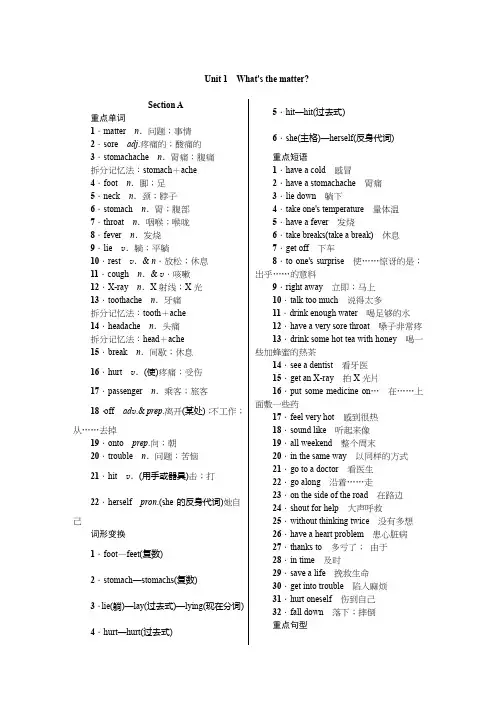
Unit 1What's the matter?Section A重点单词1.matter n.问题;事情2.sore adj.疼痛的;酸痛的3.stomachache n.胃痛;腹痛拆分记忆法:stomach+ache4.foot n.脚;足5.neck n.颈;脖子6.stomach n.胃;腹部7.throat n.咽喉;喉咙8.fever n.发烧9.lie v.躺;平躺10.rest v.& n.放松;休息11.cough n.& v.咳嗽12.Xray n.X射线;X光13.toothache n.牙痛拆分记忆法:tooth+ache14.headache n.头痛拆分记忆法:head+ache15.break n.间歇;休息16.hurt v.(使)疼痛;受伤17.passenger n.乘客;旅客18.off ad v.& prep.离开(某处);不工作;从……去掉19.onto prep.向;朝20.trouble n.问题;苦恼21.hit v.(用手或器具)击;打22.herself pron.(she的反身代词)她自己词形变换1.foot—feet(复数)2.stomach—stomachs(复数)3.lie(躺)—lay(过去式)—lying(现在分词)4.hurt—hurt(过去式)5.hit—hit(过去式)6.she(主格)—herself(反身代词)重点短语1.have a cold感冒2.have a stomachache胃痛3.lie down躺下4.take one's temperature量体温5.have a fever发烧6.take breaks(take a break)休息7.get off下车8.to one's surprise使……惊讶的是;出乎……的意料9.right away立即;马上10.talk too much说得太多11.drink enough water喝足够的水12.have a very sore throat嗓子非常疼13.drink some hot tea with honey喝一些加蜂蜜的热茶14.see a dentist看牙医15.get an Xray拍X光片16.put some medicine on…在……上面敷一些药17.feel very hot感到很热18.sound like听起来像19.all weekend整个周末20.in the same way以同样的方式21.go to a doctor看医生22.go along沿着……走23.on the side of the road在路边24.shout for help大声呼救25.without thinking twice没有多想26.have a heart problem患心脏病27.thanks to多亏了;由于28.in time及时29.save a life挽救生命30.get into trouble陷入麻烦31.hurt oneself伤到自己32.fall down落下;摔倒重点句型1.你怎么了?What's the matter with you?=What's the trouble with you?=What's wrong with you?2.她昨天说话太多,并且没喝足够的水。
(word完整版)人教版英语八年级下册重点词组、句型及语法点汇总,文档
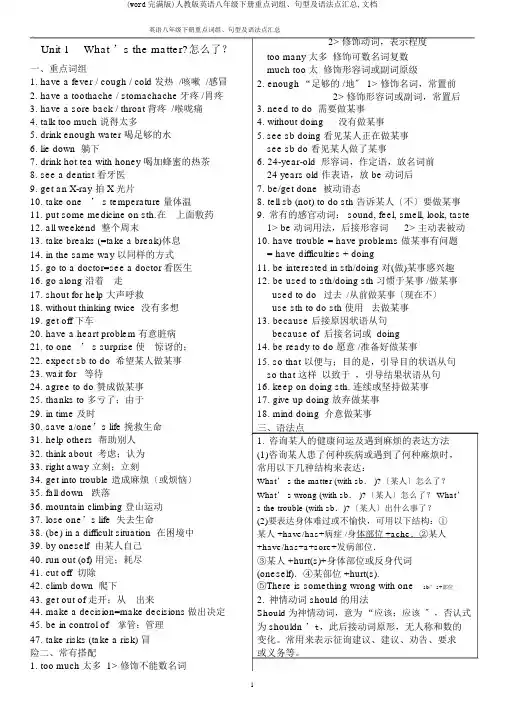
英语八年级下册重点词组、句型及语法点汇总Unit 1 What ’s the matter?怎么了?一、重点词组1. have a fever / cough / cold 发热 /咳嗽 /感冒2.have a toothache / stomachache牙疼 /胃疼3.have a sore back / throat背疼 /喉咙痛4.talk too much 说得太多5.drink enough water 喝足够的水6.lie down 躺下7.drink hot tea with honey 喝加蜂蜜的热茶8.see a dentist 看牙医9.get an X-ray 拍 X 光片10.take one ’ s temperature量体温11.put some medicine on sth.在上面敷药12.all weekend 整个周末13.take breaks (=take a break)休息14.in the same way 以同样的方式15.go to a doctor=see a doctor看医生16.go along 沿着走17.shout for help 大声呼救18.without thinking twice 没有多想19.get off 下车20.have a heart problem 有意脏病21.to one ’ s surprise使惊讶的;22.expect sb to do 希望某人做某事23.wait for 等待24.agree to do 赞成做某事25.thanks to 多亏了;由于29.in time 及时30.save a/one’s life 挽救生命31.help others 帮助别人32.think about 考虑;认为33.right away 立刻;立刻34.get into trouble 造成麻烦〔或烦恼〕35.fall down 跌落36.mountain climbing 登山运动37.lose one’s life 失去生命38.(be) in a difficult situation 在困境中39.by oneself 由某人自己40.run out (of) 用完;耗尽41.cut off 切除42.climb down 爬下43.get out of 走开;从出来44.make a decision=make decisions做出决定45. be in control of掌管;管理47.take risks (take a risk) 冒险二、常有搭配1.too much 太多 1> 修饰不能数名词2> 修饰动词,表示程度too many 太多修饰可数名词复数much too 太修饰形容词或副词原级2.enough “足够的 /地〞 1> 修饰名词,常置前2> 修饰形容词或副词,常置后3.need to do 需要做某事4. without doing没有做某事5.see sb doing 看见某人正在做某事see sb do 看见某人做了某事6.24-year-old 形容词,作定语,放名词前24 years old 作表语,放 be 动词后7.be/get done 被动语态8.tell sb (not) to do sth 告诉某人〔不〕要做某事9.常有的感官动词: sound, feel, smell, look, taste 1> be 动词用法,后接形容词2> 主动表被动10.have trouble = have problems 做某事有问题=have difficulties + doing11.be interested in sth/doing 对(做)某事感兴趣12.be used to sth/doing sth 习惯于某事 /做某事used to do过去/从前做某事〔现在不〕use sth to do sth 使用去做某事13.because 后接原因状语从句because of 后接名词或 doing14.be ready to do 愿意 /准备好做某事15.so that 以便与;目的是,引导目的状语从句so that 这样以致于,引导结果状语从句16.keep on doing sth. 连续或坚持做某事17.give up doing 放弃做某事18.mind doing 介意做某事三、语法点1.咨询某人的健康问运及遇到麻烦的表达方法(1)咨询某人患了何种疾病或遇到了何种麻烦时,常用以下几种结构来表达:What’ s the matter (with sb. )?〔某人〕怎么了?What’ s wrong (with sb. )?〔某人〕怎么了? What’s the trouble (with sb.)?〔某人〕出什么事了?(2)要表达身体难过或不愉快,可用以下结构:①某人 +have/has+病症 /身体部位 +ache.②某人+have/has+a+sore+发病部位.③某人 +hurt(s)+身体部位或反身代词(oneself).④某部位 +hurt(s).⑤There is something wrong with one sb/’s+部位2.神情动词 should 的用法Should 为神情动词,意为“应该;应该〞,否认式为 shouldn ’t,此后接动词原形,无人称和数的变化。
新人教版八年级下册英语各单元单词及重点短语句型
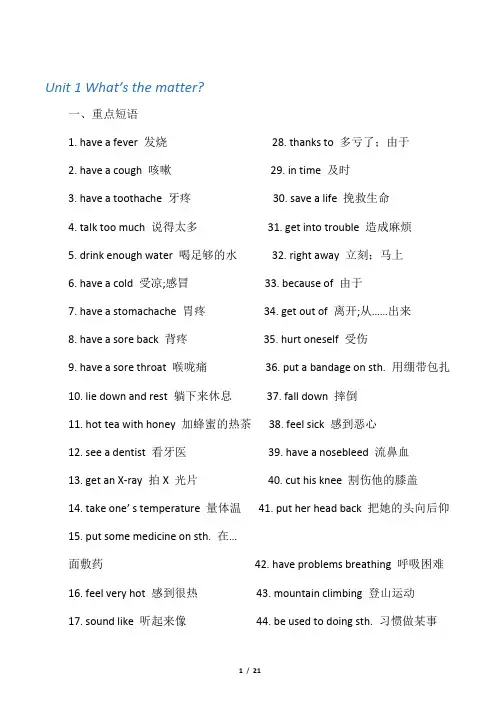
Unit 1 What’s the matter?一、重点短语1. have a fever 发烧28. thanks to 多亏了;由于2. have a cough 咳嗽29. in time 及时3. have a toothache 牙疼30. save a life 挽救生命4. talk too much 说得太多31. get into trouble 造成麻烦5. drink enough water 喝足够的水32. right away 立刻;马上6. have a cold 受凉;感冒33. because of 由于7. have a stomachache 胃疼34. get out of 离开;从……出来8. have a sore back 背疼35. hurt oneself 受伤9. have a sore throat 喉咙痛36. put a bandage on sth. 用绷带包扎10. lie down and rest 躺下来休息37. fall down 摔倒11. hot tea with honey 加蜂蜜的热茶38. feel sick 感到恶心12. see a dentist 看牙医39. have a nosebleed 流鼻血13. get an X-ray 拍X 光片40. cut his knee 割伤他的膝盖14. take one’ s temperature 量体温41. put her head back 把她的头向后仰15. put some medicine on sth. 在…面敷药42. have problems breathing 呼吸困难16. feel very hot 感到很热43. mountain climbing 登山运动17. sound like 听起来像44. be used to doing sth. 习惯做某事18. all weekend 整个周末45. run out (of) 用完;用尽19. in the same way 以同样的方式46. so that 以便20. go to a doctor 看医生47. so. . . that 如此… …以至于…21. go along 沿着……走48. be in control of 掌管;管理22. on the side of the road 在马路边49. in a difficult situation 在闲境屮23. shout for help 大声呼救50. keep on doing sth. 继续或坚持做某事24. without thinking twice 没有多想51. make a decision 做出决定25. get off 下车52. take risks 冒险26. have a heart problem 有心脏病53. give up 放27. to one’ s surprise 使.......惊讶的二、重点句型1. What’ s the matter?What’ s the matter with you?= What’s the trouble with you?= What’ s wrong with you?你怎么了?2. What should she do? 她该怎么办呢?Should I take my temperature? 我应该量一下体温吗?主语+ should/shouldn’t + 动词原形. ..①You should lie down and rest. 你应该躺下休息一会儿。
人教版八年级英语下册各单元知识点总结完整版
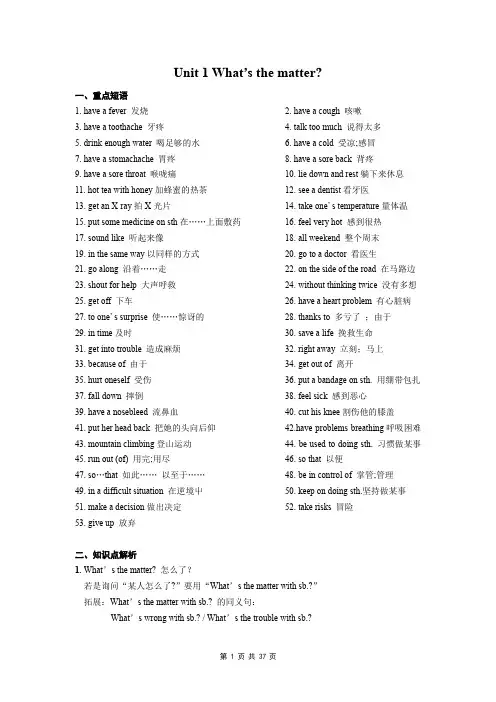
Unit 1 What’s the matter?一、重点短语1. have a fever 发烧2. have a cough 咳嗽3. have a toothache 牙疼4. talk too much 说得太多5. drink enough water 喝足够的水6. have a cold 受凉;感冒7. have a stomachache 胃疼8. have a sore back 背疼9. have a sore throat 喉咙痛10. lie down and rest躺下来休息11. hot tea with honey加蜂蜜的热茶12. see a dentist看牙医13. get an X-ray拍X光片14. take one’ s temperature量体温15. put some medicine on sth在……上面敷药16. feel very hot 感到很热17. sound like 听起来像18. all weekend 整个周末19. in the same way以同样的方式20. go to a doctor 看医生21. go along 沿着……走22. on the side of the road 在马路边23. shout for help 大声呼救24. without thinking twice 没有多想25. get off 下车26. have a heart problem 有心脏病27. to one’ s surprise 使……惊讶的28. thanks to 多亏了;由于29. in time及时30. save a life 挽救生命31. get into trouble 造成麻烦32. right away 立刻;马上33. because of 由于34. get out of 离开35. hurt oneself 受伤36. put a bandage on sth. 用绷带包扎37. fall down 摔倒38. feel sick 感到恶心39. have a nosebleed 流鼻血40. cut his knee割伤他的膝盖41. put her head back 把她的头向后仰42.have problems breathing呼吸困难43. mountain climbing登山运动44. be used to doing sth. 习惯做某事45. run out (of) 用完;用尽46. so that 以便47. so…that 如此……以至于……48. be in control of 掌管;管理49. in a difficult situation 在逆境屮50. keep on doing sth.坚持做某事51. make a decision做出决定52. take risks 冒险53. give up 放弃二、知识点解析1. What’s the matter? 怎么了?若是询问“某人怎么了?”要用“What’s the matter with sb.?”拓展:What’s the matter with sb.? 的同义句:What’s wrong with sb.? / What’s the trouble with sb.?2.疾病类短语:have a +疾病. e.g. :have a fever 发烧have a cold 感冒have a cough 咳嗽.have a +身体部位-ache. e.g.: have a headache 头痛have a toothache 牙痛.have a sore+身体部位. e.g.: have a sore throat咽喉痛have a sore back背痛例题:Mom, I____________.I’m sorry to hear that, dear. We must go to see the dentist right away.A. have a headacheB. have a stomachacheC. have a toothacheD. have a fever3. lie down 躺下V. 躺,平躺。
八年级下册英语各单元重点短语+句型语法 人教版
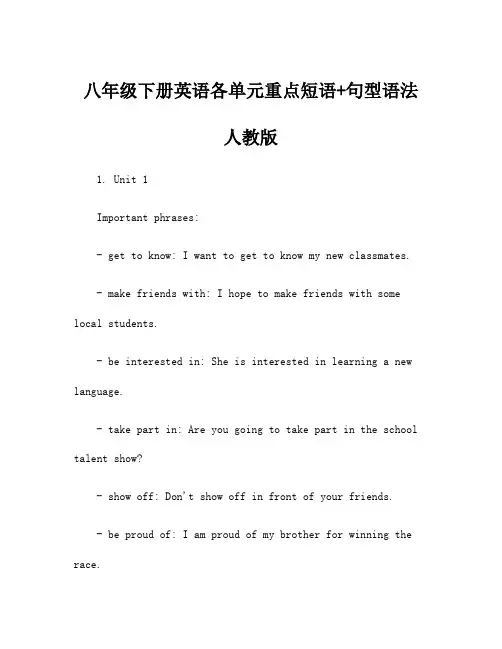
八年级下册英语各单元重点短语+句型语法人教版1. Unit 1Important phrases:- get to know: I want to get to know my new classmates.- make friends with: I hope to make friends with some local students.- be interested in: She is interested in learning a new language.- take part in: Are you going to take part in the school talent show?- show off: Don't show off in front of your friends.- be proud of: I am proud of my brother for winning the race.Sentence patterns and grammar:- Present continuous tense: He is playing football in the park.- Comparative adjectives: My sister is taller than me.- Superlative adjectives: This is the best pizza I've ever tasted.2. Unit 2Important phrases:- turn off: Don't forget to turn off the lights before you leave.- set off: We will set off for the beach early in the morning.- look forward to: I am looking forward to the schooltrip next week.- get along with: I get along with my classmates very well.- break down: Our car broke down on the way to the airport.- run out of: We ran out of milk, so I need to go to the store.Sentence patterns and grammar:- Past continuous tense: They were playing basketball when the rain started.- Modal verbs: You should study harder for the exam.- Reported speech: She said that she was going to the movies.3. Unit 3Important phrases:- be strict with: My teacher is very strict with homework deadlines.- get into: She wants to get into a good university.- take care of: Don't forget to take care of your little brother.- be good at: I am good at playing the piano.- look up to: I look up to my older sister as a role model.- come up with: We need to come up with a plan for the project.Sentence patterns and grammar:- Future perfect tense: By next year, I will havefinished high school.- Present perfect continuous tense: She has been studying English for five years.- Conditional sentences: If I had known, I would have helped you.4. Unit 4Important phrases:- call for: This situation calls for a serious discussion.- hold on: Please hold on while I transfer your call.- look out: Look out for the car coming down the road.- put off: Don't put off until tomorrow what you can do today.- try out: I want to try out for the school basketball team.- fall apart: Our friendship fell apart after the argument.Sentence patterns and grammar:- Present perfect tense: I have finished my homework.- Past perfect tense: She had already left when I arrived.- Passive voice: The cake was made by my mom.5. Unit 5Important phrases:- set up: We need to set up the equipment for the presentation.- take off: The plane will take off in an hour.- go through: I will go through my notes before the exam.- look into: The police will look into the matter.- pick up: Can you pick up some milk on your way home?- be satisfied with: I am satisfied with my test results.Sentence patterns and grammar:- Future continuous tense: They will be having dinner at7 PM.- Reported questions: He asked her where she was goingfor the holidays.- Relative clauses: The boy who won the race is my friend.6. Unit 6Important phrases:- be proud of: She is proud of her achievements.- look after: My sister looks after our pet dog.- give up: Don't give up on your dreams.- make a decision: I need to make a decision about which college to attend.- put up with: I can't put up with his behavior any longer.- take after: My son takes after his father in terms of looks.Sentence patterns and grammar:- Past perfect continuous tense: She had been studying all night when her parents arrived.- Reported commands: He told her to clean her room.- Adverb clauses: I will call you when I get home.。
新版人教版八年级下册英语1-8各单元重点短语总复习.doc
Unit 1 What’s the matter?一、重点短语1. have a fever2. have a cough3. have a toothache4. talk too much5.drink enough water6. have a cold7. have a stomachache6.8. have a sore back9. have a sore throat 10. lie down and rest11. hot tea with honey 12. see a dentist13. get an X-ray 14. take one’ s temperature15. put some medicine on sth. 16. feel very hot17. sound like 18. all weekend19. in the same way 20. go to a doctor21. go along 22. on the side of the road23. shout for help 24. without thinking twice25. get off 26. have a heart problem27. to one’ s surprise 28. thanks to29. in time 30. save a life31. get into trouble 32. right away33. because of 34. get out of35. hurt oneself 36. put a bandage on sth.37. fall down 38. feel sick39. have a nosebleed 40. cut his knee41. put her head back 42. have problems breathing43. mountain climbing 44. be used to doing sth.45. run out (of) 46. so that47. so. . . that 48. be in control of49. in a d iffic u lt situation 50. keep on doing sth.51. make a decision 52. take risks53. give up 放弃二、重点句型1. What’ s the matter?What’ s the matter with you?= What’s the trouble with you? = What’ s wrong with you?你怎么了?2. What should she do? 她该怎么办呢?Should I take my temperature? 我应该量一下体温吗?主语+ should/shouldn’t + 动词原形. ..①You should lie down and rest. 你应该躺下休息一会儿。
人教版八年级英语下册各单元语法点汇总
U n i t1W h a t’s t h e m a t t e r 一、询问某人的健康问运及遭到麻烦的表达方法1询问某人患了何种疾病或遇到了何种麻烦时;常用以下几种结构来表达:What’s the matter with sb.某人怎么了What’s wrong with sb.某人怎么了What’s the trouble with sb.某人出什么事了What happened to sb.某人发生了什么事Are you OK你没事吧Is there anything wrong with sb. 某人有什么事吗(2)要表达身体疼痛或不舒服;可用以下结构:①某人+have/has+病症.The twins have colds.双胞胎感冒了..某人+have/has+a+headache/toothache/stomachache/backache/earache.She had a stomachache last night.她昨晚肚子痛..③某人+have/has+a+sore+发病部位. He has a sore throat.他喉咙痛..④某人+hurts+身体部位或反身代词. He hurt his leg.他的腿受伤了..⑤某部位+hurts.My head hurts badly.我头痛得厉害..⑥某人+have/has+a pain+in one’s+身体部位; I have a pain in my chest.我胸口痛..⑦There issomething wrong with one’s+身体部位.There is something wrong with my right eye..我的右眼有毛病..⑧其他表达方式She has a heart trouble.她有心脏病..He got hit on the head他头部受到了撞击..She cut her finger.她割破手指了..二情态动词should的用法1.Should为情态动词;意为“应该;应当”;否定式为shouldn’t;其后接动词原形;无人称和数的变化..常用来表示征询意见、建议、劝告、要求或义务等.. You should drink hot water with honey.你应该喝加有蜂蜜的开水..He should put his head back他应该把头后仰..We should try our best to help him.我们应当尽力去帮助他.. You shouldn‘t watch TV.你不应该看电视..2.Should用于主语为第一人称的疑问句;表示征询意见.. Should I put some medicine on it 我应当给它敷上药吗 Should we tell her about it我们应该告诉她这件事吗拓展在英语中;表示建议的说法有很多;而且都是中考考查的重点..主要结构有:①Would you like to do sth.你想要/愿意做某事吗Would you like to play basketball with me你想要和我一起打篮球吗②Shall I/we do sth 我/我们做好吗Shall we go to the zoo tomorrow明天我们去动物园;好吗③Why not do sth 为什么不呢Why not join us为什么不加入到我们当中来呢④How/What about doing sth 做某事怎么样 How about going swimming去游泳怎么样⑤Let’s do sth让我们做吧.. Let’s go home.咱们回家吧..⑥You’d better not do sth你最好不要做某事..You’d better not go there alone.你最好不要一个人去那儿..Unit 2 I'll help clean up the city parks动词不定式A. 作主语——为避免句子的头重脚轻;常用it作为形式主语;而真正的主语动词不定式后置..常用句型:It +be+adj./n.+for/of sb. to do sth./It takes sb. some time to do sth.B. 作宾语——动词want; decide; hope; ask; agree; choose; learn; plan; need; teach; prepare…常接动词不定式作宾语..C. 作后置定语——常用于“have/has+sth.+to do”或“enough+名+to do”“It’s time to do sth.”等结构中..D. 作宾语补足语——tell; ask; want; invite; teach; like; call等可接带to的动词不定式作宾语补足语;构成tell/ask/want /call/invite sb. to do sth.结构..“一感feel;二听listen to; 注意动词不定式作使役动词和感官动词的宾语补足语时应省去to:hear;三让let; make; have;;四看look at; see; watch; notice;半帮助help”..E. 动词不定式作状语主要用来修饰动词;表示目的;结果或原因..为了强调目的;有时可以把动词不定式放在句首;或在不定式前加in order to 或so as to “为了;目的是”..常用结构有too + adj./adv. + to do sth.等..F. 固定句式中动词不定式的用法常见的形式有:had better not do sth./Would you like to do sth./Why not do sth./Would you please not do sth.等..Unit 3 Could you please clean your roomCould you please...句型1请求别人时通常用此句型;也可以说:Can you...please情态动词could或can在这里均表示请求;在意思上无区别;但是用could在于其上显得更委婉、客气、诚恳..在日常生活中常使用could you/I...若在句末加上please;则显得更礼貌..Could you help me find my book;please你能帮我找到我的书吗(2)对could you/I...的问句作出肯定回答;常用“sure/certainly/of course”等;如果作否定回答;常用“sorry或oh;please don’t”.. 一般不用no开头;用no显得语气生硬、不礼貌..(3)表示请求的句式:Would you like to do... Would you mind doing... Let’s do.... Shall I/we do... Please do...祈使句前加please提示:could you please...与could I Please...两种问句;前者是请求别人帮忙的句式;后者是有礼貌地向别人请求允许的交际用语..试比较:Could you please help me请你帮我一下好吗Could I please invite my friends to my birthday party;Mom 妈妈; 我能邀请我的朋友参加我的生日聚会吗Unit 4 Why don't you talk to your parents1.提建议向别人发出邀请;请求;建议;或征求某人的意见的其他表达方式:How /what about doing sth.about是个介词;可跟名词或动名词“…怎么样”You’d better not do something.“你最好不做某事”Would you like sth …:“你想要某物Let s do sth…What should I do … should表示请求、征询对方意见2.学会谈论问题和学会用why don't you…提建议向别人发出邀请;请求;建议;或征求某人的意见的表达方式:Why don t you do something =Why not do something 你为什么不做某事呢来表示请求、征询对方意见3.until; so that ;although引导的状语从句:1until:在带有till或until引导的时间状语从句里;如果主句用肯定式;其含义是“一直到……时”;谓语动词只能用延续性动词..如果主句用否定式;其含义是“直到……才……”; “在……以前不……”; 谓语动词可用瞬间动词..Don t get off until the bus stops.2so that引导目的状语从句为了;以便例如:He studies hard so that he could work better in the future3although的用法意思相当于though尽管;虽然;引导让步状语从句..引导的从句不能与并列连词but;and; so等连用;但可以和yet; still等词连用.. 例如:Although he was tired; he went on working.尽管他很累;但是他继续工作..Unit 5 What were you doing when the rainstorm came过去进行时1. 基本概念:过去进行时表示在过去某一时刻或一段时间内正在进行的动作..这一特定的过去时间除有上下文暗示以外; 一般用时间状语来表示..2.结构 was / were not + 动词-ing3.句式肯定式:I/He/She/It was working. We/You/They/ were working.否定式:I/He/She/It was not working.We/You/They/ were not working.疑问式和简略回答:Was I working Yes; you were. No; you were not. Were you working Yes; I was. No; I was not. Was he/she/it working Yes; he/she/it was. No; he/she/it was not. Were we/you/they working Yes; you/we/they were. No; you/we/they were not. 注:1 was not常缩略为wasn’t; were not常缩略为weren’t..2 一般过去时与过去进行时用法的比较: 一般过去时表示在过去某个时间发生过的动作或存在的状态; 而过去进行时则表示在过去某一时刻或某一段时间正在进行的动作.. 例如: David wrote a letter to his friend last night. 大卫昨晚给他的朋友写了封信..信写完了..David was writing a letter to his friend last night. 大卫昨晚一直在给他的朋友写信..信不一定写完..4.过去进行时中的when和whilewhen; while 区别:1)由when引导的时间状语从句;主句用过去进行时;从句应用一般过去时;由while引导的时间状语从句;主句用一般过去时;从句应用过去进行时..When the teacher came in; we were talking.当此句改变主从句的位置时;则为: While we were talking; the teacher came in. 2如果从句和主句的动作同时发生;两句都用过去进行时的时候;多用while引导..如:They were singing while we were dancing.Unit 6 An old man tried to move the mountains1. unless引导条件状语从句unless = if … not ―除非;若不They will go tomorrow unless it rains.= They will go tomorrow if it doesn’t rains.2. as soon as引导时间状语从句.. ―……就He will come and see you as soon as he can.3. so.......that引导结果状语从句句型1:主语+谓语+so+形容词/副词+that从句The wind was so strong that we could hardly move forward.句型2: so +形容词 + a/an + 单数名词 + that从句It was so hot a day that they all went swimming.句型3. so + many/ few + 复数名词 + that从句He has so few friends that he often feels lonely.句型4: so +much/ little + 不可数名词 + that 从句I had so little money that I couldn’t buy a pen.Unit 7 What’s the highest mountain in the world形容词副词的原级、比较级和最高级一原级句型:1. A is as+原级+ as+ B 表示A 与B一样…eg: He is as tall as me.2.A is not as/so +原级+ as B表示A不如B…eg:He is not as tall as me.3.只能修饰原级的词;very;quite;so;too;so; enough; pretty等例如;He is too tired to walk on.他太累了以至于不能再继续走了..(二)比较级句型可以修饰比较级的词;much;a lot;far;…的多a little;a bit;…一点儿 even甚至;still 仍然Eg. Lesson One is much easier than Lesson Two.第一课比第二课容易得多.. Tom looks even younger than before.汤姆甚至比以前更年轻..1.当句中有than 时则用比较级.. eg: He is fatter than me.2.当句子中的比较对象为两者时用比较级:“特殊疑问词+be+形容词比较级;A or B ”eg: Which is bigger;the earth or the moon 哪一个大;地球还是月球3. “比较级+and+比较级”表示“越来越……”..eg.The flowers are more and more beautiful.花儿越来越漂亮..加more构成比较级的形容词则用more and more +形容词表示越来越…eg: English is more and more important.4.“the+比较级;the+比较级”表示“越……;越……”..Eg. The more careful you are;the fewer mistakes you’ll make.5.“A+be+the+形容词比较级+of the two+……”表示“A是两者中较……的”..Eg.Look at the two boys. My brother is the taller of the two.6.A+be+形容词比较级+than+any other+单数名词+介词短语”表示“A比同一范围的任何一个人/物都……”;含义是“A最……”..Eg. The Yangtze River is longer than any other river in China.=The Yangtze River is the longest river in China.三最高级常用句型结构1.“主语+be+the+形容词最高级+单数名词+in/of短语”表示“……是……中最……的”.. eg:Tom is the tallest in his class./of all the students.This apple is the biggest of the five.2.“主语+be+one of the+形容词最高级+复数名词+in/of短语”表示“……是……中最……之一”..Eg:Beijing is one of the largest cities in China.3.“特殊疑问词+be+the+最高级+A;B;or C ”用于三者以上eg Which is the biggest The moon;the sun or ths earth4.“the +序数词+最高级+单数名词+范围”..表示…是第几大…eg: The Yellow River is the second longest river in China .注意形容词最高级之前要加the;但当最高级之前有形容词性物主代词或名词所有格时则不用加theeg: He is the best student in my class. He is my best friend.(四)形容词副词的规则与不规则变化规则变化1.一般在词尾直接加er或est;例如;tall-taller-tallest;long-longer-longest2.以不发音的字母e结尾的单词在词尾直接加r或st;例如;nice-nicer-nicest3.以辅音字母+y结尾的词;把y变为i;再加er或est;例如;heavy-heavier-heaviest4.重读闭音节;末尾只有一个辅音字母;双写这个辅音字母;再加er或est;eg. big-bigger-biggest5.部分双音节词和多音节词分别在原级前加more构成比较级和most构成最高级;例如;slowly-more slowly-most slowly;beautiful- more beautiful-most beautiful 不规则变化Unit 8 Have you read Treasure Island yetUnit 9 Have you ever been to a museum现在完成时 Present Perfect Tense1表示过去发生或已经完成的动作对现在造成的影响或结果..—It’s so dark. 太黑了..—Someone has turned off the light. 有人把灯关上了..2表示从过去某一时间开始并一直持续到现在的动作或状态..常与since+过去的时间点;for+一段时间;since+时间段+ego; so far等时间状语连用.. Eg. I have lived here for ten years.我已经住在这里10年了..从10年前开始;持续到现在还住这儿Eg. I have lived here since 2003. 自从2003年我就住在这儿..从2003年开始;持续到现在还住这儿3 基本结构及句型转换:主语+have/has+过去分词done 当主语是第三人称单数has;其余人称用have..①肯定句:主语+have/has+过去分词+其他 I have finished my homework. 肯定句②否定句:主语+have/has+not+过去分词+其他 I have not finished my homework. 否定句③一般疑问句:Have/Has+主语+过去分词+其他—Have you finished your homework—Yes; I have. / No; I haven’t; 一般疑问句及肯定、否定回答4has gone to; has been to; has been in 的区别Have/Has goneto :去了现在不在说话现场Eg. ---Where is your father---He has gone to Shanghai.Have/Has been to :去过已不在去过的地方Eg. My father has been to Shanghai.Have/has been in:呆了多久还在所呆的地方Eg. My father has been in Shanghai for two months. =My father has been in Shanghaisince two months ago.5现在完成时的标志:①常与just; already; yet; ever; never; before; so far 等连用;强调动作的完成;不强调动作的持续..Have you ever been to Japan I have just finished my homework.②for + 时间段;since + 过去的时间点;since + 段时间 ago;since + 一般过去时的句子..They have known each other for five years. Since he was a child; he has lived in England.(6)动词过去式和过去分词的变化规则变化: 1. 一般在动词词尾直接加ed..如:pick → picked → picked; wish →wished → wished; stay → stayed → stayed2. 以不发音的e结尾的动词后面加d..如:like → liked → liked; hope → hoped →hoped; phone → phoned → phoned3. 以―辅音字母 + y‖结尾的动词;变y为i;再加-ed..如:study → studied → studied; hurry → hurried → hurried; reply → replied → replied4. 词尾只有一个辅音字母的重读闭音节动词;要双写辅音字母;再加-ed..如:stop →stopped → stopped; clap → clapped → clapped不规则变化:5.以不变应万变..如:let → let → let; put → put → put; read → read → read6. 若中间有双写e;则去掉一个e;单词末尾再加t..如:feel → felt → felt; keep → kept → kept; sleep → slept → slept7. 结尾的字母d变t..如:lend → lent → lent; build → built → built; send →sent → sent8. 变为以-ought或-aught结尾..如:buy → bought → bought;bring → brought → brought; catch → caught → caught; teach → taught →taughtUnit 10 I've had this bike for three years.短暂性动词buy; die; join; finish等不能直接与for; since 连用; 需要改变动词..1)beginstart--be on2 open--be open3)become--be4)die--be dead5) fall asleep-- be asleep6)close -- be closed7)end/ finish---be over8) put on--wear9)leave-- be awayfrom 10)catch a cold--have a cold11)join the army--in the army/be a soldier12)borrow---keep13)join the party-- be in the party/ be a party member14) buy---have15come/go/ arrive/reach/get /move to---be in /at总结:1.现在完成时表示过去发生的动作对现在造成的影响和结果;2.还可以表示过去发生的动作;一直持续到现在;也有可能持续下去.3..一般情况下;for+时间段; since+过去的时间点;since + 段时间 ago;since + 一般过去时的句子4.句型:现在完成时态have/has+延续性动词的过去分词+ for/ since...。
人教版八年级英语下册全册知识点考点整理
八年级英语下册全册各单元知识点考点整理Unit 1 what's the matter?一、重点短语1.too much太多2.lie down躺下3.get an X-ray做个X光检查4.take one’s temperature量体温5.put some medicine on......在....上敷药6.have a fever发烧7.take breaks/take a break休息8.without thinking twice没多想9.get off下车10.take sb to the hospital送某人去医院11.wait for等待12.to one’s surprise使.......惊讶的13.thanks to多亏于;由于14.in time及时15.think about考虑16.have a heart problem患有心脏病17.get into the trouble遇到麻烦18.do the right thing做正确的事情事情19.fall down摔倒20.put......on sth把...放在某物上21.get hit/sunburned摔伤/烧伤22.be interested in对.....感兴趣23.be used to习惯于....24.take risks/take a risk挑战25.lose one’s life失去生命26.because of因为27.run out of用完28.cut off切除29.get out of从...出来30.make a decision/decisions做决定31.be in control of掌管;管理32.give up放弃主要句型1.It’s+形容词+for sb.+to do sth.做某事对某人来说是…的。
It’s important to do sth.做某事很重要。
初二下册人教版英语重点词汇和句型总结
八年级下英语短语及句型总结Unit 1 短语及句型1.there will be 将会有There will be more people.将会有更多的人Will there be less pollution?会有更少的污染吗? Yes,there will.\ No,therewon’t.是,会有。
\ 不,不会有。
2.many\much---- more +可数或不可数名词更多few --- fewer + 可数名词更多little ----- less +不可数名词更少例如:more people、morepollution、less free time、less pollution、fewer cars、fewer trees3.be free 免费的4. on computers 在电脑上on paper 在纸上5.live to be 活到live tobe 200 years old 活到200岁6.fall in love with sb.\sth.喜爱某人或某物7.live alone 单独居住8.on vacation 度假9.over and over again 一遍又一遍10.be the same as 与…一样be different from 与…不同unit 2 单词及短语1.What should I\he\she\they\you do? 我\他\她\他们\你该怎么办?You could write him aletter. 你可以给他写一封信。
2.argued with sb. 与某人争吵3.out of style 过时的in style 时尚的4.a ticket to a ball game一场球赛的票5.surprise sb. 使某人惊奇be surprised at sth. 对…感到惊奇to one’s surprise 令某人惊奇的事6.pay for 支付7.ask sb. for sth. 向某人要求某物ask sb. to do sth. 要求某人做某事8.have a bake sale 烧烤9.find out 发现,查明10.get on well with sb. 与某人相处得好11.have a fight with sb. 与某人争吵、打架12.not……until 直到…才13.it’s time for sth.\it’stime to do sth. 做某事的时间到了14.under too muchpressure 承受太多的压力15.take part in 参加,参与16.a mother of three 三个孩子的妈妈Unit 3 短语及句型1.What were you doingwhen the UFO arrived?当UFO到达时你在干什么?2.While the boy waswalking down the street,the UFO landed.当男孩在沿着街道走时,UFO降落了3.in front of 在…之前(外部整体前)in the front of (内部整体前)4.talk on the phone 在电话中交谈nd on the street 在街上降落6.walk down the street 沿着街道走7.take off (过去式tookoff) 起飞8.around ten o’clock 大约10点9.You can imagine howstrange it was!你可以想象它有多奇怪!10.Museum of Flight 飞行博物馆11.jump down 跳下来12.in a tree 在树上ona tree 长在树上13.run away 跑开,逃跑14.say to sb. 对某人说15.one of the mostimportant events 最重要的事件之一(one of + 形容词最高级+名词复数)最…之一16.in silence 无声的17.take place 发生(预先安排)happen 发生(偶然)18.have meaning to sb. 对…来说有意义Unit 4 短语及句型1.He said he was hard-working. 他说他努力学习了2.She said she was havinga party for Lana她说她为Lana举行了聚会3.mad at sb. 对某人生气4.first of all 首先5.pass sth. to sb. \ pass onsth. 传递某物6.be sppoused to 应该7.I’m better at readingthan listening. 我的阅读比听力好。
- 1、下载文档前请自行甄别文档内容的完整性,平台不提供额外的编辑、内容补充、找答案等附加服务。
- 2、"仅部分预览"的文档,不可在线预览部分如存在完整性等问题,可反馈申请退款(可完整预览的文档不适用该条件!)。
- 3、如文档侵犯您的权益,请联系客服反馈,我们会尽快为您处理(人工客服工作时间:9:00-18:30)。
.Unit 1 What’s the matter?1.问题;事情n____________2.怎么了?出什么事了_______3.疼痛的;酸痛的adj__________4.感冒____________5.胃痛;腹痛n____________6.胃痛___________7.脚;足n_______________8.脖子;颈部n _____________9.胃;腹部n________________10.喉咙;咽喉_n________________11.发烧; n_______________12.躺;平躺v_______________13.躺下______________14.放松;休息v n__________15.咳嗽n v________________16. X射线;X光n___________17.牙痛n______________18.量体温_____________19.头痛n_______________20.发烧____________21.间歇;休息n________________22.休息____________________23.(使)疼痛;受伤v___________24.乘客;旅客n______________25.离开(某处);不工作;从..去掉___________________26.下车_____________________27.使...惊讶的;出乎...意料____28.向;朝prep________29.问题,苦恼n___________30.(用手或器具)击;打v_______31.立即;马上__________32.陷入;参与__________33.她自己pron_____________34.绷带n 用绷带包扎v_______35.生病的;有病的adj__________36.膝;膝盖n___________37.鼻出血n___________38.呼吸v___________39.晒伤的adj___________40.我们自己pron___________41.登山者;攀登者n________42.习惯于...;适应于..._______43.危险;风险;冒险n v_________44.冒险___________45.交通事故;意外遭遇n______46.情况;状况n__________47.千克;公斤n__________48.岩石n_________49.用尽;耗尽__________50.刀n___________51.切除___________52.血n__________53.意思是;打算;意欲v________54.离开;从...出来___________55.重要性;重要n_________56.决定;抉择n__________57.限制;约束;管理n v_____58.掌管;管理_____59.勇气;意志n_____60死;死亡n_____61.放弃_____62.护士n_____二、重点短语1. have a fever2. have a cough3. have a toothache4. talk too much.5. drink enough water6. have a cold7. have a stomachache8. have a sore back9. have a sore throat10. lie down and rest11. hot tea w ith honey12. see a dentist13. get an X-ray14. take one’ s temperature15. put some medicine on sth16. feel very hot17. sound like18. all weekend19. in the same way20. go to a doctor21. go along22. on the side of the road23. shout for help24. without th inking twice25. get off26. have a heart problem 27. to one’ s surprise28. thanks to29. in time30. save a life31. get into trouble32. right away33. because of34. get out of35. hurt oneself36. put a bandage on sth.37. fall down38. feel sick39. have a nosebleed40. cut his knee41. put her head back42. have problems breathing43. mountain climbing44. be used to doing sth.45. run out (of)46. so. . . that47. be in control of48. in a difficult situation59. keep on doing sth.60. make a decision 51. take risks52. give up三、重点句型1. What’ s the matter (with ---)?= What’s the trouble (with ---)?= What’ s wrong (with ---)?= What’ s --- problem?2. What should she do?Should I take my temperature?①You should lie down and rest.② You shouldn’ t go out at night.3. Do you think it comes from a newspaper or a book?4. I think I sat in the same way for too long without moving.5. She said that the man had a heart problem and should go to the hospital.Unit 2 I’ll help to clean up the city parks1.打扫或清除干净___________2.欢呼;喝彩v__________3.使变得高兴;振奋起来_____4.分发;散发___________5.义务做;自愿做v 自愿者n____6.想出;提出(主意、计划、回答等)7.推迟___________8.标志;信号n___________9.通知、通告n注意到;意识到v10.分发___________11.打电话给某人;征召___________12.曾经...;过去...___________13孤独的;寂寞的adj__________14.照顾;非常喜欢__________15.几个;数个;一些pron_____16.强烈的;强壮的adj________17.感觉;感触n________18.满足;满意n_________19.高兴;愉快n_________20.物主;主人n_________21.参加...选拔;试用_______22.尤指长途旅行;行程n______23.募集;征集v________24.独自;单独adv__________25.修理;修补v__________26.修理;安装v________27.修理;装饰_________28.赠送;捐赠_________29.(外貌或行为)像_____30.破损的;残缺的adj_____31.车轮;轮子n_____32信;函n _____33女士;小姐n_____34建起;设立_____35丧失能力的;有残疾的adj36影响;有作用_____37瞎的;失明的adj_____38聋的adj_____39想象;设想v_____40困难;难题n_____41开;打开v_____42门n_____43拿;提;扛v_____44训练;培训n_____45仁慈;善良n_____46聪明的;聪颖的adj_____47理解;领会v_____48变化;改变v n _____49兴趣;关注n 使感兴趣使关注v 50先生n_____51夫人;女士n_____一、重点短语1. Clean-Up Day _____________2. an old people’s home ___________3. help out with sth. _____________4. used to _____________5. care for _____________6. the look of joy _____________7. at the age of _____________8clean up _____________9. cheer up ____________10. give out _____________11. come up w ith _____________12. make a plan _____________13. make some notices _____________14. try out _____________15. work for _____________16. put up _____________17. hand out _____________18. call up _____________19. put off _____________20. for example _____________21. raise money _____________22. take after _____________23. give away _____________24. fix up _____________25. be similar to _____________26. set up _____________27. disabled people _____________28. make a difference _____________29. be able to _____________30. after-school reading program________________31.sick children _____________32.at the food bank _____________二、重点句型1.The boy could give out food at the food bank.这个男孩可以在食品救济站分发食物。
